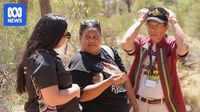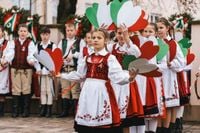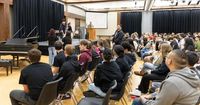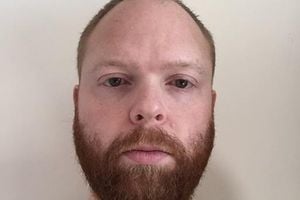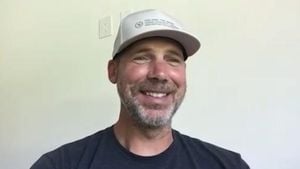On April 3, 2025, Katalin Szili, the Prime Minister’s senior advisor, addressed the opening day of the two-day international conference titled "Diaspora 2025 – Revitalization" in Pécs, Hungary. The conference focused on the Hungarian communities in the diaspora, emphasizing the importance of preserving the Hungarian language and culture.
Szili highlighted that Hungarian is not an endangered language, thanks to the existence of its motherland and the active efforts of Hungarian communities abroad. "There are 6,000 languages spoken in the world, of which, according to optimists, about 600 are safe," she said. "Furthermore, 500 languages are known only by 50 speakers each, categorizing them as extremely endangered." Her remarks underscored the critical role that language plays in maintaining cultural identity.
During her speech, Szili stressed the necessity of creating an institutional framework to support Hungarian communities in preserving their language. This initiative is facilitated through cultural programs such as the Kőrösi Csoma Sándor, Petőfi Sándor, and Mikes Kelemen programs, all aimed at providing cultural support and resources.
"The preservation of language is the basis for the preservation of identity. If we lose our language, we lose our culture, traditions, and everything connected to our identity," Szili emphasized. She pointed out that Hungary bears a responsibility for its citizens living beyond its borders, linking this duty to the establishment of a dialogue framework that could potentially lead to national reunification.
As part of the conference, participants explored various linguistic, cultural, and social phenomena related to Hungarian communities in the diaspora. The discussions aimed to empower these communities through diverse methods, including language, music, dance, literature, cultural anthropology, media, cultural diplomacy, and politics. The goal was to foster cooperation between the Carpathian Basin and diaspora communities, as well as to promote Hungarian-Hungarian dialogue and cross-border networking.
Szili noted that this was the second diaspora conference being held at the University of Pécs, which aims to serve as a hub for Hungarians worldwide. She also pointed out a growing interest among young people of foreign descent in learning about their Hungarian roots, with many seeking to understand the language and culture of their ancestors.
Meanwhile, on the other side of the globe, two Indigenous groups, the Yuchi of Oklahoma and the Pertame of Central Australia, are also engaged in a vital language revival effort. They have formed a partnership to share strategies and support each other in their mission to revitalize their endangered languages.
In March 2025, at a language forum in Alice Springs, four-year-old Zoday Bearpaw captivated the audience by telling a story in the Yuchi language. His performance marked a significant milestone for the Yuchi tribe, as he is among the first new generation in a century to speak Yuchi as a first language. Zoday recounted a simple folktale about a rabbit and turkeys, but for his community, it represented a profound achievement in language revival.
Families from the Yuchi tribe traveled to Alice Springs to meet with the Pertame people, who have faced their own challenges in language preservation. Samantha Armstrong, a Pertame language worker, expressed her inspiration from the Yuchi people's journey. "Seeing them go from just one elder to a child speaking the language … it really inspired me," she said. "If they can do it, then so can we."
Currently, the Pertame community has fewer than 31 speakers who grew up speaking Pertame as their first language, primarily among the older generation. Armstrong explained that the Pertame School became the first school in Australia to adopt the Yuchi immersion method in 2023, aiming to teach the younger generation to speak and live in their mother tongue.
The bond between the Yuchi and Pertame people began in 2019 at a UN Indigenous Language workshop in New York, where they discovered their shared struggles in saving their languages. The Yuchi elders, including Richard Grounds, have emphasized the importance of language in cultural identity. "Without our languages, our youth begin to become lost," he stated, linking language preservation to healing from issues like substance abuse and high suicide rates in their communities.
Both groups are committed to reversing the damage caused by historical policies that suppressed their languages. Yuchi parents Micha and Keland Bearpaw are raising their children to speak Yuchi from birth, aiming to rebuild their community's linguistic foundation. "When it was taken from us, they started with the children. We're reversing the damage by starting with our children," Keland Bearpaw remarked.
As the Yuchi and Pertame communities continue their efforts, they are not only preserving their languages but also fostering a sense of identity and belonging among their youth. "Our language is medicine," Grounds said, emphasizing that reclaiming their languages is essential for the well-being of their communities.
In summary, both the Hungarian diaspora conference and the partnership between the Yuchi and Pertame groups highlight the global importance of language preservation. As these communities work tirelessly to revitalize their languages, they demonstrate that cultural identity is intricately linked to the languages we speak. The efforts of Szili and her counterparts in Hungary, along with the Yuchi and Pertame families, serve as powerful reminders of the significance of language in shaping our identities and connecting us to our heritage.
